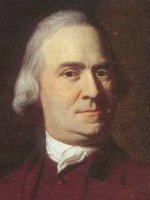“The workmen all pack’d up their tools and left the barracks”
As commander of all the British army in North American, Gov. Thomas Gage had faced that problem before back in 1768. Then the royal government had ended up renting buildings from willing owners and turning them into barracks. But in 1774 there were more regiments to house, and even more on the way.
Gage asked Boston’s selectmen to forestall what would amount to a labor strike. They replied that they actually wanted the troops grouped in barracks, but they had no power over rural towns’ policies.
The next day, 26 September, Andrews reported that Gage approached John Hancock directly. Since Hancock was one of the selectmen, he might already met with the general. Hancock was also the chair of the Massachusetts Provincial Congress, and thus might have had leverage with other towns, but Gage officially refused to recognize that extralegal body. Furthermore, at the start of August, the governor had dismissed Hancock as commander of the Company of Cadets, so coming to the man for a favor was quite a concession.
Andrews wrote:
Sometime this day the Governor had a conference with Col: Hancock, requesting him to use his influence with the Committee to re-consider their vote respecting the barracks.The work stoppage took hold the next day:
The Colonel observ’d to him that he had taken every possible measure to distress us: that notwithstanding it was the Solicitor’s opinion that the [Boston Port] Act could be construed to prevent goods, &ca., being transported within ye. bounds of the harbour, yet he had not suffered it to he done, and the Ships of War had seiz’d whatever had been attempted to be transported in that manner.
He likewise told him that he had been threat’ned, and apprehended his person was in danger, as it had been gave out by some of his people that he deserv’d to he hang’d: upon which the Governor told him he might have a guard, if he chose it, to attend him night and day. You will naturally conclude that he declin’d accepting.
At four o’clock yesterday afternoon, the workmen all pack’d up their tools and left the barracks, frames, &ca.; so that I am apprehensive we in the town will feel ill effects of it, as it has been given out that the troops will force quarters next month, if barracks are not provided for ’em: neither should I blame them for so doing, as the nights are so cold already, that it’s impossible for ’em to sleep comfortable under their slight canvas tents. And as to empty houses, now since we have got so many [Loyalist] refugees among us, there is not half sufficient to hold what troops we have got already here.New York’s Patriots had already voted not to cooperate with the British army in Boston, a move that reportedly inspired the rural towns’ decision.
After the carpenters had left off work, the General sent Col. Robinson [actually James Robertson] and Major [William] Sheriff to Mr. Hancock, to let him know if they would proceed with the barracks, he could suffer any thing to be transported within the limits of the harbour, under the sanction of King’s stores—but all would not avail; as they very justly suppos’d, that after the work was compleated he would withdraw the indulgence, as he deems it, though in justice it not be prevented at all.
They have got the Carpenters from the Ships of War, and have sent an arm’d Schooner to Halifax for all the Artificers they can procure from there. It’s possible they may be as averse to coming as the Yorkers.
On 29 September, the merchant reported:
In the course of a day or two past, the Roxbury people have burnt several load of straw that was bringing in here, which has enrag’d the soldiers to such a degree, that I am in continual apprehension we shall soon experience another fifth of March, which God forbid!In those same days, Andrews described how the Royal Artillery, Boston’s Patriot leaders, and ordinary people were all maneuvering over the mortars, cannon, and other ordnance in the inventory of hardware merchant Joseph Scott. Meanwhile, other artillery pieces were being seized by one side or the other (the focus of my book, The Road to Concord). Andrews was not alone in fearing that violence could break out any day.








